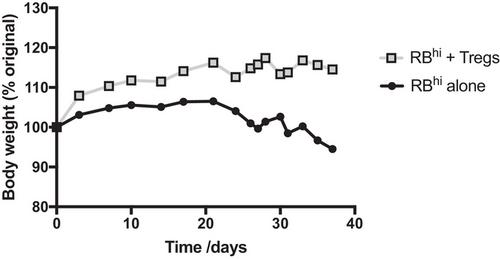Claire F. Pearson, Kevin J. Maloy
{"title":"最新进展:通过注射新生 CD4+ T 细胞诱导免疫缺陷小鼠患炎症性肠病(T 细胞转移结肠炎模型)。","authors":"Claire F. Pearson, Kevin J. Maloy","doi":"10.1002/cpz1.1092","DOIUrl":null,"url":null,"abstract":"<p>The intestinal inflammation induced by injection of naïve CD4<sup>+</sup> T cells into lymphocyte-deficient hosts (more commonly known as the T cell transfer model of colitis) shares many features of idiopathic inflammatory bowel disease (IBD) in humans, such as epithelial cell hyperplasia, crypt abscess formation, and dense lamina propria lymphocyte infiltration. As such, it provides a useful tool for studying mucosal immune regulation as it relates to the pathogenesis and treatment of IBD in humans. In the IBD model described here, colitis is induced in <i>Rag</i> (recombination-activating gene)-deficient mice by reconstitution of these mice with naïve CD4<sup>+</sup>CD45RB<sup>hi</sup> T cells through adoptive T cell transfer. Although different recipient hosts of cell transfer can be used, Rag-deficient mice are the best characterized and support studies that are both flexible and reproduceable. As described in the Basic Protocol, in most studies the transferred cells consist of naïve CD4<sup>+</sup> T cells (CD45RB<sup>hi</sup> T cells) derived by fluorescence-activated cell sorting from total CD4<sup>+</sup> T cells previously purified using immunomagnetic negative selection beads. In a Support Protocol, methods to characterize colonic disease progression are described, including the monitoring of weight loss and diarrhea and the histological assessment of colon pathology. © 2024 The Author(s). Current Protocols published by Wiley Periodicals LLC.</p><p><b>Basic Protocol</b>: Induction of IBD in Rag-deficient mice by the transfer of naïve CD4<sup>+</sup>CD45RB<sup>hi</sup> T cells</p><p><b>Support Protocol</b>: Monitoring development of colitis</p>","PeriodicalId":93970,"journal":{"name":"Current protocols","volume":"4 7","pages":""},"PeriodicalIF":0.0000,"publicationDate":"2024-07-15","publicationTypes":"Journal Article","fieldsOfStudy":null,"isOpenAccess":false,"openAccessPdf":"https://onlinelibrary.wiley.com/doi/epdf/10.1002/cpz1.1092","citationCount":"0","resultStr":"{\"title\":\"Update: Induction of Inflammatory Bowel Disease in Immunodeficient Mice by Injection of Naïve CD4+ T cells (T Cell Transfer Model of Colitis)\",\"authors\":\"Claire F. Pearson, Kevin J. Maloy\",\"doi\":\"10.1002/cpz1.1092\",\"DOIUrl\":null,\"url\":null,\"abstract\":\"<p>The intestinal inflammation induced by injection of naïve CD4<sup>+</sup> T cells into lymphocyte-deficient hosts (more commonly known as the T cell transfer model of colitis) shares many features of idiopathic inflammatory bowel disease (IBD) in humans, such as epithelial cell hyperplasia, crypt abscess formation, and dense lamina propria lymphocyte infiltration. As such, it provides a useful tool for studying mucosal immune regulation as it relates to the pathogenesis and treatment of IBD in humans. In the IBD model described here, colitis is induced in <i>Rag</i> (recombination-activating gene)-deficient mice by reconstitution of these mice with naïve CD4<sup>+</sup>CD45RB<sup>hi</sup> T cells through adoptive T cell transfer. Although different recipient hosts of cell transfer can be used, Rag-deficient mice are the best characterized and support studies that are both flexible and reproduceable. As described in the Basic Protocol, in most studies the transferred cells consist of naïve CD4<sup>+</sup> T cells (CD45RB<sup>hi</sup> T cells) derived by fluorescence-activated cell sorting from total CD4<sup>+</sup> T cells previously purified using immunomagnetic negative selection beads. In a Support Protocol, methods to characterize colonic disease progression are described, including the monitoring of weight loss and diarrhea and the histological assessment of colon pathology. © 2024 The Author(s). Current Protocols published by Wiley Periodicals LLC.</p><p><b>Basic Protocol</b>: Induction of IBD in Rag-deficient mice by the transfer of naïve CD4<sup>+</sup>CD45RB<sup>hi</sup> T cells</p><p><b>Support Protocol</b>: Monitoring development of colitis</p>\",\"PeriodicalId\":93970,\"journal\":{\"name\":\"Current protocols\",\"volume\":\"4 7\",\"pages\":\"\"},\"PeriodicalIF\":0.0000,\"publicationDate\":\"2024-07-15\",\"publicationTypes\":\"Journal Article\",\"fieldsOfStudy\":null,\"isOpenAccess\":false,\"openAccessPdf\":\"https://onlinelibrary.wiley.com/doi/epdf/10.1002/cpz1.1092\",\"citationCount\":\"0\",\"resultStr\":null,\"platform\":\"Semanticscholar\",\"paperid\":null,\"PeriodicalName\":\"Current protocols\",\"FirstCategoryId\":\"1085\",\"ListUrlMain\":\"https://onlinelibrary.wiley.com/doi/10.1002/cpz1.1092\",\"RegionNum\":0,\"RegionCategory\":null,\"ArticlePicture\":[],\"TitleCN\":null,\"AbstractTextCN\":null,\"PMCID\":null,\"EPubDate\":\"\",\"PubModel\":\"\",\"JCR\":\"\",\"JCRName\":\"\",\"Score\":null,\"Total\":0}","platform":"Semanticscholar","paperid":null,"PeriodicalName":"Current protocols","FirstCategoryId":"1085","ListUrlMain":"https://onlinelibrary.wiley.com/doi/10.1002/cpz1.1092","RegionNum":0,"RegionCategory":null,"ArticlePicture":[],"TitleCN":null,"AbstractTextCN":null,"PMCID":null,"EPubDate":"","PubModel":"","JCR":"","JCRName":"","Score":null,"Total":0}
引用次数: 0


 求助内容:
求助内容: 应助结果提醒方式:
应助结果提醒方式:


